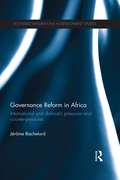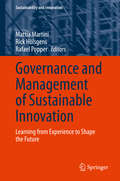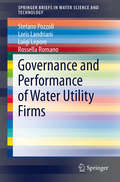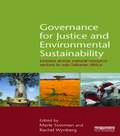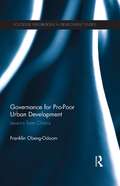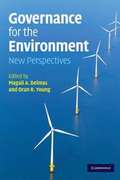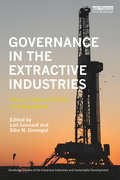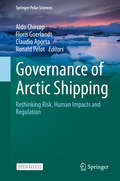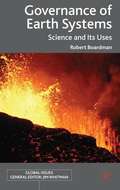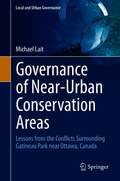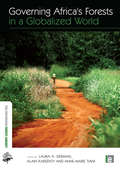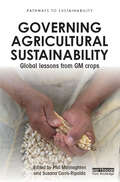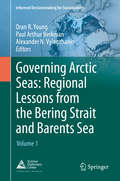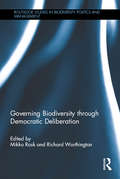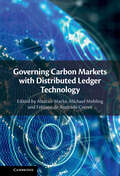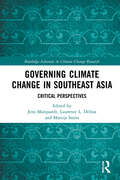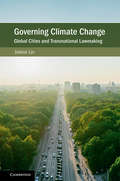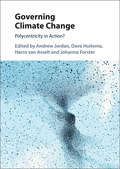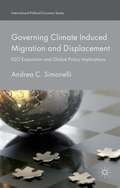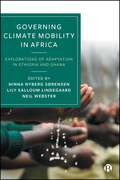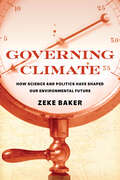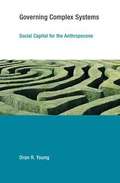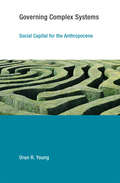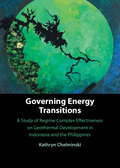- Table View
- List View
Governance Reform in Africa: International and Domestic Pressures and Counter-Pressures (Routledge Explorations in Development Studies)
by Jerome BachelardPoor governance is increasingly recognized as the greatest impediment to economic development in Sub-Saharan Africa. Currently, some impressive governance reforms are underway in many countries. This includes cases such as Nigeria – formerly the most corrupt country in the world according to Transparency International. Yet other countries such as Chad are still in reform deadlock. To account for these differences, this book examines governance reform in Sub-Saharan Africa based on an analysis of international and domestic pressures and counter-pressures. It develops a four phase model explaining why governance reforms advance in some instances, whilst in others governance reforms stagnate or even relapse. No study has sought to systematically examine the political forces, both international and domestic, behind the successful conduct of governance reform in Sub-Saharan Africa. Yet, coordination, collaboration and mutual support between international and domestic actors is critical to push individual governments onto the path of reform. This book shows that while international and domestic pro-reform pressures are important, an analysis of anti-reform pressures is also necessary to explain incomplete or failed reform. The main theoretical arguments are structured around four hypotheses. The hypotheses are theoretically generated and tested over four case studies – Madagascar, Kenya, Nigeria and Chad. On this basis, the good governance socialization process is inductively developed in the concluding chapter. This model illustrates how governance practices can evolve positively and negatively in all countries of Sub-Saharan Africa, based on the nature and relative strength of international and domestic pressures and counter-pressures.
Governance and Management of Sustainable Innovation: Learning from Experience to Shape the Future (Sustainability and Innovation)
by Mattia Martini Rick Hölsgens Rafael PopperSustainable innovation (SI) is considered to be a key driver of societal progress in an era of enormous economic, environmental and societal challenges, and the uncertainties and future consequences that come with them. This book provides evidence, insights and reflections related to specific issues of governance, the management of sustainable innovation and applying a multi-level, multi-stakeholder approach to sustainable innovation analysis. Building on the European Commission (EU) funded research project “Public Participation in Developing a Common Framework for the Assessment and Management of Sustainable innovation” (CASI), it presents tools for assessing and managing sustainable innovation, and reflects on SI-related policies as well as citizens’ aspirations. The book is intended for scholars in the field of sustainable innovation, as well as to policymakers, innovators, students and citizens.
Governance and Performance of Water Utility Firms
by Stefano Pozzoli Loris Landriani Luigi Lepore Rossella RomanoIn Italy, the debate about the reform process, that has involved the water sector for several years, cannot be considered concluded. It seems exclusively ideological and often it does not consider the business administration perspective, which certainly could make a contribution to the solution of different problems. Politicians and researchers, for example, show very little interest for the economic and financial performance of water utility firms, focusing almost exclusively on the different ways for providing the services or on the ownership structure. This work analyzes the variables characterizing the outsourcing process in the water sector. It also explores the connection of such variables with the performance of companies and local government authorities involved in the delivery process. Subsequently, the work explains the results of an exploratory analysis of different cases in the international context, making also a comparison about the performance. Lastly, the work verifies the existence of some best practices and evaluates the adaptability of these best practices in the Italian context.
Governance for Justice and Environmental Sustainability: Lessons across Natural Resource Sectors in Sub-Saharan Africa
by Rachel Wynberg Merle SowmanUnderstanding the governance of complex social-ecological systems is vital in a world faced with rapid environmental change, conflicts over dwindling natural resources, stark disparities between rich and poor and the crises of sustainability. Improved understanding is also essential to promote governance approaches that are underpinned by justice and equity principles and that aim to reduce inequality and benefit the most marginalised sectors of society. This book is concerned with enhancing the understanding of governance in relation to social justice and environmental sustainability across a range of natural resource sectors in Sub-Saharan Africa. By examining governance across various sectors, it reveals the main drivers that influence the nature of governance, the principles and norms that shape it, as well as the factors that constrain or enable achievement of justice and sustainability outcomes. The book also illuminates the complex relationships that exist between various governance actors at different scales, and the reality and challenge of plural legal systems in much of Sub-Saharan Africa. The book comprises 16 chapters, 12 of them case studies recounting experiences in the forest, wildlife, fisheries, conservation, mining and water sectors of diverse countries: Madagascar, Zimbabwe, Botswana, Namibia, South Africa, Zambia, Mozambique, Sierra Leone and Cameroon.Through insights from these studies, the book seeks to draw lessons from the praxis of natural resource governance in Sub-Saharan Africa and to contribute to debates on how governance can be strengthened and best configured to meet the needs of the poor, in a way that is both socially just and ecologically sustainable.
Governance for Pro-Poor Urban Development: Lessons from Ghana (Routledge Explorations in Development Studies)
by Franklin Obeng-OdoomThe world development institutions commonly present 'urban governance' as an antidote to the so-called 'urbanisation of poverty' and 'parasitic urbanism' in Africa. Governance for Pro-Poor Urban Development is a comprehensive and systematic analysis of the meaning, nature, and effects of 'urban governance' in theory and in practice, with a focus on Ghana, a country widely regarded as an island of good governance in the sub region. The book illustrates how diverse groups experience urban governance differently and contextualizes how this experience has worsened social differentiation in cities. This book will be of great interest to students, teachers, and researchers in development studies, and highly relevant to anyone with an interest in urban studies, geography, political economy, sociology, and African studies.
Governance for the Environment
by Magali A. Delmas Oran R. YoungWe live in an era of human-dominated ecosystems in which the demand for environmental governance is rising rapidly. At the same time, confidence in the capacity of governments to meet this demand is waning. How can we address the resultant governance deficit and achieve sustainable development? This book brings together perspectives from economics, management, and political science in order to identify innovative approaches to governance and bring them to bear on environmental issues. The authors' analysis of important cases demonstrates how governance systems need to fit their specific setting and how effective policies can be developed without relying exclusively on government. They argue that the future of environmental policies lies in coordinated systems that simultaneously engage actors located in the public sector, the private sector, and civil society. Governance for the Environment draws attention to cutting-edge questions for practitioners and analysts interested in environmental governance.
Governance in the Extractive Industries: Power, Cultural Politics and Regulation (Routledge Studies of the Extractive Industries and Sustainable Development)
by Lori Leonard Siba N. GrovoguiGreater understanding of the forms and consequences of investment and disinvestment in the extractive industries is required as a result of capitalist expansion, recent declines in global commodity prices, and claims that extractive sector projects, especially in the global south, are poverty reduction projects. This book explores emergent forms of governance in mining and extractive industry projects around the world. Chapters examine efforts to govern extractive activities across multiple political scales, through intermediaries, instruments, technologies, discourses, and infrastructures. The contributions analyse how multiple micro-processes of rule reverberate through societies to shape the material conditions of everyday life but also politics, social relations, and subjectivities in extractive economies. Detailed case studies are included from Africa (Chad, Nigeria, Rwanda, and São Tomé and Príncipe), Latin America (Bolivia, Ecuador, and Peru), and the UN Climate Conference.
Governance of Arctic Shipping: Rethinking Risk, Human Impacts and Regulation (Springer Polar Sciences)
by Claudio Aporta Aldo Chircop Floris Goerlandt Ronald PelotThis open access book is a result of the Dalhousie-led research project Safe Navigation and Environment Protection, supported by a grant from the Ocean Frontier Institute’s the Canada First Research Excellent Fund (CFREF). The book focuses on Arctic shipping and investigates how ocean change and anthropogenic impacts affect our understanding of risk, policy, management and regulation for safe navigation, environment protection, conflict management between ocean uses, and protection of Indigenous peoples’ interests. A rapidly changing Arctic as a result of climate change and ice loss is rendering the North more accessible, providing new opportunities while producing impacts on the Arctic. The book explores ideas for enhanced governance of Arctic shipping through risk-based planning, marine spatial planning and scaling up shipping standards for safety, environment protection and public health.
Governance of Earth Systems: Science and Its Uses
by Robert BoardmanScience and politics are closely connected in today's global environmental issues. This book focuses on these links in relation to climate change, the threats to wildlife species, and natural hazards and disasters. Study of these reveals the need for more effective international cooperation and the limits of global governance.
Governance of Near-Urban Conservation Areas: Lessons from the Conflicts Surrounding Gatineau Park near Ottawa, Canada (Local and Urban Governance)
by Michael LaitThis book comprehensively describes the history of Gatineau Park, from the first proposals for a “national park” in the early 1900s to the governance issues in the present period, and it highlights the issues concerning the planning and governance of this unique near-urban ecological area. The 34,500-hectare Gatineau Park is an ecologically diverse wilderness area near the cities of Ottawa (Canada’s national capital) and Gatineau. Gatineau Park is planned and managed as the “Capital’s Conservation Park” by the federal government, specifically the National Capital Commission (NCC). This monograph examines numerous governmental and non-governmental actors that are engaged in the governance of a near-urban wilderness area. Unlike Canada’s national parks, Gatineau Park’s administration involves all three levels of government (federal, provincial, and four municipalities). This book is the first to document the relations among the public and private entities, and is one of only a handful of studies concerning the governance of Canada’s National Capital Region (NCR), which is relatively unique in the literature on federal capitals. Of particular interest to students of governance will be the examination of federal-provincial relations, as the Governments of Canada and Quebec have had a notoriously strained relationship. As the first governance study of Gatineau Park, the monograph will provide readers with insight into the significance of non-state actors, showing the range of competencies that public and private groups deploy in their negotiations with NCC planners, policymakers, park managers, local and federal politicians.
Governing Africa's Forests in a Globalized World (The Earthscan Forest Library)
by Alain Karsenty Laura A. German Anne-Marie TianiMany countries around the world are engaged in decentralization processes, and most African countries face serious problems with forest governance, from benefits sharing to illegality and sustainable forest management. This book summarizes experiences to date on the extent and nature of decentralization and its outcomes - most of which suggest an underperformance of governance reforms - and explores the viability of different governance instruments in the context of weak governance and expanding commercial pressures over forests. Findings are grouped into two thematic areas: decentralization, livelihoods and sustainable forest management; and international trade, finance and forest sector governance reforms. The authors examine diverse forces shaping the forest sector, including the theory and practice of decentralization, usurpation of authority, corruption and illegality, inequitable patterns of benefits capture and expansion of international trade in timber and carbon credits, and discuss related outcomes on livelihoods, forest condition and equity. The book builds on earlier volumes exploring different dimensions of decentralization and perspectives from other world regions, and distills dimensions of forest governance that are both unique to Africa and representative of broader global patterns. The authors ground their analysis in relevant theory while drawing out implications of their findings for policy and practice.
Governing Agricultural Sustainability: Global lessons from GM crops (Pathways to Sustainability)
by Phil Macnaghten Susana Carro-RipaldaAlthough GM crops are seen by their advocates as a key component of the future of world agriculture and as part of the solution for world poverty and hunger, their uptake has not been smooth nor universal: they have been marred by controversy and all too commonly their regulation has been challenged as inadequate, even biased. This book aims to understand these dynamics, examining the impacts of GM crops in diverse contexts and their potentials to contribute to sustainable agricultural futures. Part 1 draws on research from three global ‘rising powers’ – Brazil, India and Mexico – exploring the views of scientists, farmers and publics. Using a diverse array of ethnographic and qualitative methodologies, the book examines the dynamics that have underpinned the controversy in three diverse geo-political contexts, the manner in which dominant institutional framings have been closely aligned with the interests of powerful elites, and the multiple ways in which these have been resisted through local, symbolic and material practices. Part 2 comprises a series of short comment pieces from 11 leading social and natural scientists responding to the question of how to develop a policy framework for the responsible innovation of sustainable, culturally appropriate and socially just agricultural GM technologies. This innovative book offers new insights for researchers and postgraduates in Science and technology studies, Agro-ecology and Environmental Studies, Development studies, Anthropology, Human Geography, Sociology, Political Science, Public Administration, Latin American studies, and Asian studies.
Governing Arctic Seas: Volume 1 (Informed Decisionmaking for Sustainability)
by Oran R. Young Paul Arthur Berkman Alexander N. VylegzhaninGoverning Arctic Seas introduces the concept of ecopolitical regions, using in-depth analyses of the Bering Strait and Barents Sea Regions to demonstrate how integrating the natural sciences, social sciences and Indigenous knowledge can reveal patterns, trends and processes as the basis for informed decisionmaking. This book draws on international, interdisciplinary and inclusive (holistic) perspectives to analyze governance mechanisms, built infrastructure and their coupling to achieve sustainability in biophysical regions subject to shared authority. Governing Arctic Seas is the first volume in a series of books on Informed Decisionmaking for Sustainability that apply, train and refine science diplomacy to address transboundary issues at scales ranging from local to global. For nations and peoples as well as those dealing with global concerns, this holistic process operates across a ‘continuum of urgencies’ from security time scales (mitigating risks of political, economic and cultural instabilities that are immediate) to sustainability time scales (balancing economic prosperity, environmental protection and societal well-being across generations). Informed decisionmaking is the apex goal, starting with questions that generate data as stages of research, integrating decisionmaking institutions to employ evidence to reveal options (without advocacy) that contribute to informed decisions. The first volumes in the series focus on the Arctic, revealing legal, economic, environmental and societal lessons with accelerating knowledge co-production to achieve progress with sustainability in this globally-relevant region that is undergoing an environmental state change in the sea and on land. Across all volumes, there is triangulation to integrate research, education and leadership as well as science, technology and innovation to elaborate the theory, methods and skills of informed decisionmaking to build common interests for the benefit of all on Earth.
Governing Biodiversity through Democratic Deliberation (Routledge Studies in Biodiversity Politics and Management)
by Mikko Rask Richard WorthingtonThis book discusses political controversies involved in global biodiversity policy, and the practical opportunities that are opened up in solving them through increased citizen participation and democratic deliberation. It examines the emerging practice of deliberative global governance and its political consequences. The collection focuses on the intersection of global biodiversity policy and the promise of deliberative democracy. In doing so, it examines how new discursive logics emerge in global citizen deliberation that might destabilize the impasses encountered in biodiversity negotiations, how a "global citizens’ voice" emerges in deliberative processes despite the dominance of national institutions in the lives of those citizens, the most effective and innovative ways to amplify the results of large-scale deliberations to policy makers and broader audiences, and how future citizen deliberations can be designed to make them fair, feasible and consequential processes, in general and for biodiversity issues in particular. This highly original contribution to the field provides theoretical discussions, empirical analyses and local experiences of biodiversity policy, making it an invaluable resource for students and scholars of environmental politics, governance and sociology, particularly those interested in deliberative democracy, citizen participation and biodiversity.
Governing Carbon Markets with Distributed Ledger Technology
by Alastair Marke Michael A. Mehling Correa, Fabiano de AndradeCarbon markets involve complex governance challenges, such as ensuring transparency of emissions, facilitating as well as recording transactions, overseeing market activity and preventing abuse. Conventionally, these have been addressed with a combination of regulatory, procedural and technical structures that impose significant burdens on market participants and administrators while remaining vulnerable to system shocks and illicit practices. Distributed Ledger Technology (DLT) has the potential to address these problems. This volume offers the first book-length exploration of how carbon markets can be governed using DLT, offering conceptual and theoretical analysis, practical case studies, and a roadmap for implementation of a DLT-based architecture in major existing and emerging carbon markets. It surveys existing expertise on distributed ledger technology, provides progress updates from industry professionals, and shows how this technology could offer a cost-effective and sustainable solution to double-counting and other governance concerns identified as major challenges in the implementation of carbon markets.
Governing Climate Change in Southeast Asia: Critical Perspectives (Routledge Advances in Climate Change Research)
by Jens MarquardtThis volume showcases the diversity of the politics and practices of climate change governance across Southeast Asia. Through a series of country-level case studies and regional perspectives, the authors in this volume explore the complexities and contested nature of climate governance in what can be considered as one of the most dynamic and multi-faceted regions of the world. They reflect upon the tensions between authoritarian and democratic climate change governance, the multiple roles of civil society and non-state interventions, and the conflicts between state planning and market-driven climate change governance. Shedding light on climate change mitigation and adaptation efforts in Southeast Asia, this book presents the various formal and informal institutions of climate change governance, their relevant actors, procedures, and policies. Empirical findings from a diverse set of environments are merged into a cross-country comparison that allows for elaborating on similar patterns whilst at the same time highlighting the distinct features of climate change governance in Southeast Asia. Drawing on case studies from all Southeast Asian countries, namely Brunei Darussalam, Cambodia, Indonesia, Laos, Malaysia, Myanmar, the Philippines, Singapore, Thailand, Timor-Leste, and Viet Nam, this book will be of great interest to students, scholars, and practitioners dealing with climate change and environmental governance.
Governing Climate Change: Global Cities and Transnational Lawmaking (Cambridge Studies on Environment, Energy and Natural Resources Governance)
by Jolene LinCities are no longer just places to live in. They are significant actors on the global stage, and nowhere is this trend more prominent than in the world of transnational climate change governance (TCCG). Through transnational networks that form links between cities, states, international organizations, corporations, and civil society, cities are developing and implementing norms, practices, and voluntary standards across national boundaries. In introducing cities as transnational lawmakers, Jolene Lin provides an exciting new perspective on climate change law and policy, offering novel insights about the reconfiguration of the state and the nature of international lawmaking as the involvement of cities in TCCG blurs the public/private divide and the traditional strictures of 'domestic' versus 'international'. This illuminating book should be read by anyone interested in understanding how cities - in many cases, more than the countries in which they're located - are addressing the causes and consequences of climate change.
Governing Climate Change: Polycentricity In Action?
by Andrew Jordan Dave Huitema Van Asselt Harro Johanna ForsterClimate change governance is in a state of enormous flux. New and more dynamic forms of governing are appearing around the international climate regime centred on the United Nations Framework Convention on Climate Change (UNFCCC). They appear to be emerging spontaneously from the bottom up, producing a more dispersed pattern of governing, which Nobel Laureate Elinor Ostrom famously described as 'polycentric'.<P><P> This book brings together contributions from some of the world's foremost experts to provide the first systematic test of the ability of polycentric thinking to explain and enhance societal attempts to govern climate change. It is ideal for researchers in public policy, international relations, environmental science, environmental management, politics, law and public administration. It will also be useful on advanced courses in climate policy and governance, and for practitioners seeking incisive summaries of developments in particular sub-areas and sectors. <P> The first systematic application of polycentric theory in the area of climate change, offering a much more realistic appreciation of the potential and limits of polycentric governing.<P> A novel attempt to comprehend climate governance as a single, evolving system, rather than a series of isolated parts.<P> Draws together fresh insights provided by a diverse team of international experts on the most significant domains and processes of governing.<P> The book, also published as Open Access, is linked to a massive open online course (MOOC) developed by the Open University of the Netherlands, providing a rich set of relevant learning materials for students and early career researchers.
Governing Climate Induced Migration and Displacement: Igo Expansion And Global Policy Implications (International Political Economy Series)
by Andrea SimonelliAndrea Simonelli provides the first in-depth evaluation of climate displacement in the field of political science, specifically global governance. She evaluates four intergovernmental organizations (UNHCR, IOM, OCHA and the UNFCCC), and the structural and political constraints regarding their potential expansion to govern this new issue area.
Governing Climate Mobility in Africa: Explorations of Adaptation in Ethiopia and Ghana
by Ninna Nyberg Sørensen, Lily Salloum Lindegaard and Neil WebsterAvailable open access digitally under CC BY NC ND licence. Climate change is often understood as a main driver of human mobility in Africa, but this book demonstrates the many other factors that also come into play in households´ mobility practices including those linked to gender, finance and livelihoods. Using case studies from Ethiopia and Ghana, the edited collection reveals how the two countries’ governance structures play significant roles in shaping households’ agency and mobility options. It shows that mobility has long been practised in both countries and is important for households’ livelihoods and resilience to climate change. The book concludes with policy recommendations for institutional practices that can support adaptive climate mobility.
Governing Climate: How Science and Politics Have Shaped Our Environmental Future
by Zeke BakerAfter decades of debate about global warming, the fact of the climate crisis is finally widely accepted. People at all scales—from the household to the global market—are attempting to govern climate to deal with its causes and impacts. Although the stakes are different now, governing climate is centuries old. In this book, Zeke Baker develops a genealogy of climate science that traces the relationship between those who have created knowledge of the climate and those who have attempted to gain power and govern society, right up to the present, historic moment. Baker draws together over two centuries of science, politics, and environmental change to demonstrate the "co-production" of climate knowledge and power-seeking activity, with a focus on the United States. This book provides a fresh account of contemporary issues transecting science and climate politics, specifically the rise of "climate security," and examines how climate science can either facilitate or reconcile the unequal distribution of power and resources.
Governing Complex Systems: Social Capital for the Anthropocene
by Oran R. YoungThe onset of the Anthropocene, an era in which human actions have become major drivers of change on a planetary scale, has increased the complexity of socioecological systems. Complex systems pose novel challenges for governance because of their high levels of connectivity, nonlinear dynamics, directional patterns of change, and emergent properties. Meeting these challenges will require the development of new intellectual capital. In this book, Oran Young argues that to achieve sustainable outcomes in a world of complex systems, we will need governance systems that are simultaneously durable enough to be effective in guiding behavior and agile enough to adapt to rapidly changing circumstances. While some insights from past research on governance remain valid in this setting, Young argues that we need new social capital to supplement mainstream regulatory approaches that feature rule making with an emphasis on compliance and enforcement. He explores the uses of goal setting as a governance strategy, the idea of principled governance, and the role of what is often called good governance in meeting the challenges of the Anthropocene. Drawing on his long experience operating on the science/policy frontier, Young calls for more effective collaboration between analysts and practitioners in creating and implementing governance systems capable of producing sustainable outcomes in a world of complex systems.
Governing Complex Systems: Social Capital for the Anthropocene (Earth System Governance)
by Oran R. YoungAn exploration of the need for innovative mechanisms of governance in an era when human actions are major drivers of environmental change.The onset of the Anthropocene, an era in which human actions have become major drivers of change on a planetary scale, has increased the complexity of socioecological systems. Complex systems pose novel challenges for governance because of their high levels of connectivity, nonlinear dynamics, directional patterns of change, and emergent properties. Meeting these challenges will require the development of new intellectual capital. In this book, Oran Young argues that to achieve sustainable outcomes in a world of complex systems, we will need governance systems that are simultaneously durable enough to be effective in guiding behavior and agile enough to adapt to rapidly changing circumstances. While some insights from past research on governance remain valid in this setting, Young argues that we need new social capital to supplement mainstream regulatory approaches that feature rule making with an emphasis on compliance and enforcement. He explores the uses of goal setting as a governance strategy, the idea of principled governance, and the role of what is often called good governance in meeting the challenges of the Anthropocene. Drawing on his long experience operating on the science/policy frontier, Young calls for more effective collaboration between analysts and practitioners in creating and implementing governance systems capable of producing sustainable outcomes in a world of complex systems.
Governing Energy Transitions: A Study of Regime Complex Effectiveness on Geothermal Development in Indonesia and the Philippines
by Kathryn ChelminskiAs the world moves with increasing urgency to mitigate climate change and catalyze energy transitions to net zero, understanding the governance mechanisms that will unlock barriers to energy transitions is of critical importance. This book examines how the clean energy regime complex-the fragmented, complex sphere of governance in the clean energy issue area characterized by proliferating and overlapping international institutions-can be effective in fostering energy transitions at the domestic level, particularly in emerging market and developing economies (EMDEs). Through comparative case studies of geothermal development in Indonesia and the Philippines, the chapters provide two different tales of energy transitions, demonstrating how domestic factors have hindered or facilitated progress. This book will be useful for students, researchers, and practitioners working in international relations, energy politics, political science, development studies, public policy, international law, and sociology. This title is also available as Open Access on Cambridge Core.
Governing Europe's Marine Environment: Europeanization of Regional Seas or Regionalization of EU Policies? (Corbett Centre for Maritime Policy Studies Series)
by Michael GilekGoverning Europe's Marine Environment is a coherent up-to-date multidisciplinary analysis of current approaches and challenges to the sustainable governance of Europe's marine environment. Structured in three parts, Part 1 outlines general theoretical ideas about governance, governing, and governability and serves as a starting point for analysing the development of marine governance in Europe from the perspective of different disciplines. Part 2 includes studies of EU marine governance. Part 3 focuses on Europe's regional seas, namely the Baltic Sea, the North Sea, the Black Sea, and the Mediterranean Sea. This book presents a better understanding of the fragmented governance of marine governance in Europe and in particular the tension between the Europeanization of regional seas and the regionalization of EU policies.
